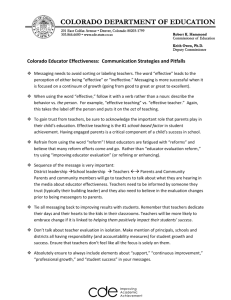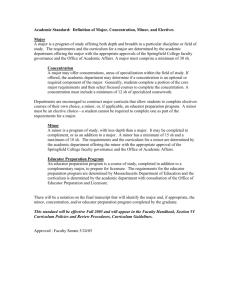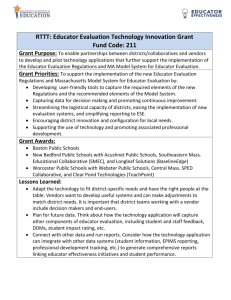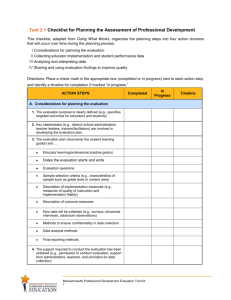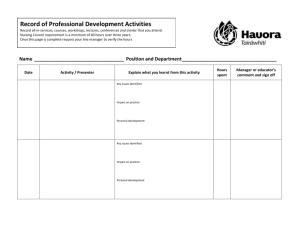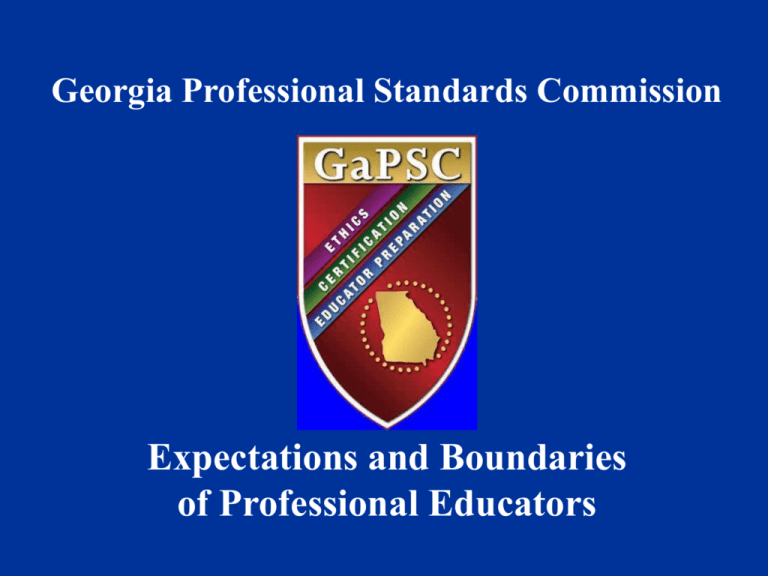
Georgia Professional Standards Commission
Expectations and Boundaries
of Professional Educators
Professional Standards
Commission
Certification
Educator
Preparation
Ethics
2
The Code of Ethics,
State and Federal Law,
DOE and BOE Rules
Establish Standards for
Educator Conduct
Code of Ethics - 11 Standards
1.
2.
3.
4.
5.
6.
7.
Legal compliance
Conduct with students
Alcohol or Drugs
Honesty
Public funds and property
Remunerative Conduct
Confidential information
Code of Ethics - 11 Standards
8.
9.
10.
11.
Abandonment of Contract
Required Reports
Professional Conduct
Testing
Levels of Sanctions
Warning
Reprimand
Suspension
Revocation
Denial of Certificate
6
Probable Cause Results
Year
FY 2001
FY 2002
FY 2003
FY 2004
FY 2005
FY 2006
FY 2007
FY 2008
FY 2009
FY 2010
FY 2011
Denied
15
20
31
26
25
42
23
33
25
13
18
Revoked
58
44
62
57
93
72
76
54
71
67
58
Voluntary
Total
Surrender
14
16
21
20
22
17
26
16
27
28
20
87
80
114
103
140
131
125
103
123
108
96
Educators are held
to higher standards
than other
professionals!
"Don't worry that
children never listen
to you. Worry that
they are always
watching you."
Robert Fulghum, American author (b. 1937)
Professional Educators
have the responsibility for
establishing and
controlling the boundaries
in their professional
relationships.
Standard 2
Conduct With
Students
The Most Important
Boundary
Code of Ethics Standard 2
An educator shall
always maintain a
professional
relationship with all
students, both in and
outside the classroom.
A STUDENT is anyone:
enrolled in a Georgia public
or private school from
preschool through grade 12,
or
anyone under the age of 18.
For the purposes of the Code
of Ethics, the enrollment
period for a graduating
student ends on August 31 of
the year of graduation.
Professional Relationship Boundary
Child Abuse
Including Physical
and Verbal Abuse
O.C.G.A. § 19-7-5
‘Child abuse’ includes the following
conduct by a child’s parent or caretaker:
Physical injury or death (by other than
accidental means)
Neglect or exploitation of a child
Sexual abuse - an act of apparent sexual
stimulation or gratification ...
Sexual exploitation - allows, permits,
encourages, or requires a child to engage in
prostitution or sexually explicit conduct ….
Abuse
The educator kicked a student’s chair, pushed
him to the floor, threw a book and yard stick in
his direction, threw him down to the floor, and
sat on top of him. The student escaped out the
window and ran to the principal's office. He was
bleeding from the mouth and stated that the
educator had knocked out his tooth. The
principal searched the room and found the
missing tooth.
Professional Relationship Boundary
Sexual
Misconduct
Sexual Abuse of
Students
The Unforgivable Boundary
Violation
Sexual Abuse is defined as
ANY sex act with a student!
Sexual Abuse
of Students
Older Women
The educator engaged in sexual
misconduct with a male student
that she taught in the sixth grade
the previous year. The relationship
involved telephone, text messaging,
e-mail and internet contacts, and
the student and the educator
engaging in sexual activity.
Physical Education teacher and gymnastics coach, age 27,
in Illinois convicted of having sex with a teen age boy.
"When boys sexually interact with older women they're
viewed as lucky," she said. "When girls sexually interact
with an older male it's seen as them being victimized."
But that kind of thinking is shortsighted, Ortiz said.
Minors of any age are not cognitively developed
enough to make important decisions about sexual
interactions or able to "fully understand the
consequences of such actions later in their lives."
Defendant: Ashley M. Blumenshine (Law enforcement photo / January 7,
2011) Charge: Criminal sexual abuse
Sexual Misconduct Rarely
Begins With an Act of
Sexual Abuse
A boundary violation
involving sexual contact is
more of a process than a
single event.
Habitual Sex Offender Process
• “troll” for children with a weak
sense of boundaries, targeting
them for abuse,
• “groom” their victims with
gifts and attention, and
• “lull” them into complacency,
escalating the level of physical
intimacy over time.
Mary Jo McGrath
Grooming 101
The educator permitted students to skip their
scheduled classes, hang out in his classroom, use
his school computer to access internet sites, and
provided them with notes to justify being out of
their scheduled classes. A 17-year-old female
student alleged that the educator touched her in a
sexual manner, exposed himself, and asked her to
perform oral sex on him when they were alone in
the classroom.
Predator
The educator provided cigarettes, alcohol
and pornography to a 14 year-old student
who frequently spent the night at his home.
During a computer chat, the educator
admitted that he found the student sexually
attractive, that the student’s appearance
and actions sexually stimulated him and
asked for advice on how to initiate sexual
interaction between himself and the
student. Child pornography was found on
the educator's computer. He pled guilty to
Enticing A Child For Indecent Purposes.
Young people instinctively
recognize these boundary
violations and often
nickname the employee
engaged in such violations a
“pervert,” based on their
perceived sense of
inappropriateness.
Mary Jo McGrath
Anatomy Class?
The educator kissed and hugged
students and touched their hips,
buttocks and breasts. He
requested that a female student
meet with him before school
and told her to wear a thong or
no underwear because he
needed to check her body.
He’s In Love With The Girl
The educator had a romantic
relationship with a student. He
attended the student’s athletic events
(with roses), bought her a cell phone,
and took gifts for the student to her
school. They were text messaging and
talking on the phone extensively, and
the educator emailed the student a
seven page love letter/story.
A Picture is Worth…
The educator asked a
female student to take
nude pictures of herself
and show them to him.
Student Relationships
Teacher was alone in car with a girl and
had an inappropriate conversation with
her on facebook about kissing her.
Two year suspension
32
Avoiding
Allegations of
Inappropriate
Relationships
Student Relationship Guidelines
Be Friendly,
Not a Friend.
Student Relationship Guidelines
Choose
Appropriate
Settings
Student Relationship Guidelines
Social Networking
Don’t accept students as friends
and decline any student initiated
social network friend requests.
Don’t post anything on a website
that you would not post on the
front door of the school.
Standard #2 continued:
Unethical Conduct with Students Includes:
7.
failing to monitor or prevent the
use of alcohol or
illegal/unauthorized drugs by
students who are under the
educator’s supervision (including but
not limited to the educator’s residence or
any other private setting).
Professional Boundary
Other
Boundaries in
the Code of
Ethics
STANDARD # 1 – LEGAL
COMPLIANCE
An educator shall
abide by federal,
state, and local laws
and statutes.
Legal Compliance
Educator admits to having been arrested for
felony Forgery. The educator is currently serving
the terms of a First Offender Act program
including restitution payments over $18,000.
The educator is currently serving a 10 year
probation with a law enforcement agency.
Standard #3 - Alcohol or
Drugs
An educator shall
refrain from the use of
alcohol or illegal or
unauthorized drugs
during the course of
professional practice.
Illegal and
Unauthorized
Drugs are Always
Illegal and
Unauthorized.
Home made recipe
Teacher brought colleague at
school medicine containing
moonshine to help cure cough
Avoiding Pain
A coworker videotaped the educator
stealing pain medication from her purse.
The educator initially denied the theft.
When confronted with the evidence, the
educator admitted to the theft of the drug
and to ingesting the prescribed medication
at school.
Second Job
The educator was arrested for
trafficking marijuana. Fifty
pounds of marijuana was found
in the educator's home. The
home "reeked" of the smell of
smoked and fresh marijuana.
Three children were in the
home at the time of the arrest.
Standard 3: Alcohol or Drugs
Possession
=
Possession of a CONTAINER of
alcoholic beverage
(not in the blood stream).
Bottles, Cans, Etc.
When in Italy…
The educator served as a chaperone on a
school-sponsored trip to Italy. He admitted
that he consumed one alcoholic beverage
after hours on three nights of the eight-day
trip. The educator acknowledged that he
had made a mistake by consuming the
alcoholic beverages, but denied that he
failed to properly supervise students during
the trip.
Fortification
The educator admits consuming two glasses
of wine prior to attending a school talent
show. Three teachers witnessed the
educator's manifestations of intoxication.
The educator had glassy red eyes, slightly
slurred speech, generally giddy behavior and
the odor of an alcoholic beverage on her
person.
Alcohol or Drugs
A teacher had concerns about the educator’s
“peculiar” behavior and suspected he was under
the influence. The teacher did not report the
concern until the end of the day when the
educator had left to begin a 3-day weekend. The
next week the educator claimed he had taken
some OTC medicine for pain. NPC
49
Standard #4 - Honesty
An educator shall
exemplify honesty
and integrity in the
course of professional
practice.
Standard #4 - Honesty
Unethical conduct includes but is not limited to falsifying,
misrepresenting, or omitting:
1. professional qualifications, criminal
history, college or staff development
credit and/or degrees, academic award, and
employment history;
3. information regarding the evaluation of
students and/or personnel;
Standard #4 - Honesty
Unethical conduct includes but is not limited to, falsifying,
misrepresenting, or omitting:
4. reasons for absences or leaves;
5. information submitted in the
course of an official
inquiry/investigation;…
Honesty
The educator submitted a report of
absence using three sick leave days to
attend daughter’s out of state wedding.
Suspension
Honesty
Teacher signed a field experience
form for another teacher when the
intern when the teacher did not
complete the work
54
Standard 5 - Public Funds and
Property
An educator entrusted
with public funds and
property shall honor that
trust with a high level of
honesty, accuracy, and
responsibility.
School Funds
Band director used personal funds
to make payments for trip and paid
herself back as students brought
their money
Former State School
Superintendent
The educator converted money
that was intended for students
to be used for her own
purposes. She pled guilty to
Conspiracy & Conspiracy to
Money Launder involving
approximately $600,000 of
education funds.
Starting Your Own Business
The educator purchased and used school
system equipment to create and store
pornographic material to further his
private business (the production and
distribution of pornography). The
educator forged the superintendent’s
signature to obtain unauthorized
equipment and to have the school system
billed for that equipment.
The Collector
The educator was charged
with Sexual Exploitation of
Children for the possession of
material depicting a minor
engaging in sexually explicit
conduct. His home and school
computers contained over
59,000 porn images.
Superintendent
The educator used his school system
computer and cell phone to solicit a
sexual relationship with someone
that he believed to be a 14 or 15
year-old female. She was, in reality,
a law enforcement officer.
Pornography was discovered during
a search of his school system office
and computer.
Public Funds and Property
An audit of a yearbook account revealed a
significant deficit and $945.25 in
unaccounted funds. The educator stated
that errors in recordkeeping including the
deposit of funds to the wrong student
activity account could have resulted in the
unaccountable funds.
Suspension
61
Standard #6 - Remunerative Conduct
An educator shall maintain
integrity with students,
colleagues, parents,
patrons, or businesses
when accepting gifts,
gratuities, favors, and
additional compensation.
Fund Raiser
Educator held fund raiser for 4th grade trip.
After trip she continued with the candy fund
raiser and began an unauthorized t-shirt sale.
Audit revealed unaccounted funds of $2,628.50
plus she purchased gift certificates for herself
and another teacher for a “Day at the Spa”
Standard #7 - Confidential Information
An educator shall comply with
state and federal laws and
state school board policies
relating to the confidentiality
of student and personnel
records, standardized test
material and other
information.
Confidential Information
Educator folds report cards of students who
make failing grades; consequently the rest of the
class knows who is failing
Educator also asked for all children who were
going to be retained to raise their hands so
everyone could see
Standard #8 - Abandonment of Contract
An educator shall fulfill all
of the terms and
obligations detailed in the
contract with the local
board of education or
education agency for the
duration of the contract.
Abandonment of Contract
The educator gave a two week notice. The
school system did not release her from her
contract. She left anyway.
90 day suspension.
67
Standard #9 - Required Reports
An educator shall file
reports of a breach of one or
more of the standards in the
Code of Ethics for
Educators, child abuse, or
any other required report.
Former School Principal
The school principal failed to report
sexual misconduct by a teacher after
being told that a female student was
regularly meeting the male teacher and
that they were often seen in close
proximity. The principal confirmed that
there were rumors about the male
teacher and female students after the
male teacher was arrested and charged
with four counts of Sexual Assault.
Required Reports
The Educator admitted to being informed by
both a student and by the paraprofessional with
whom the student was involved that they were
having sexual encounters. The educator did not
disclose this information to anyone until there
was a law enforcement investigation.
Revoke
(criminal charges are pending against the educator)
70
Standard #10 - Professional Conduct
An educator shall
demonstrate conduct that
follows generally recognized
professional standards and
preserves the dignity and
integrity of the teaching
profession.
Professional Conduct Cases
• Organized a betting pool with students
• Called a student a “heifer” and her mother
“stupid”
• Gave extra credit to students who
contributed to a fundraiser
• Left class without permission via a window
• Had two loaded guns in desk drawer
• Sexually harassed a colleague
• Restrained a teacher and tried to kiss her
against her will
• Sexual interaction with colleague on
school grounds
Standard #11 - Testing
An educator shall
administer state
mandated assessments
fairly and ethically.
Standard 11: Testing
Unethical conduct includes but is not limited to:
1.
2.
committing any act that breaches Test
Security; and
compromising the integrity of the
assessment.
Acts that Breach Test
Security/Confidentiality
Possessing unauthorized copies of state
tests.
Copying or taking notes on test items.
Revealing in any manner any part of
secure copyrighted tests to students or
others.
Acts that Breach Test
Security/Confidentiality
Discussing test items or answers.
Using secure test items and prompts
for instructional purposes.
Reviewing answers to test questions.
Failing to inventory test materials
upon receipt.
Acts that Compromise the Integrity of
the Assessment.
Failing to provide or attend required
training.
Failing to provide state approved
accommodations.
Providing accommodations not in an
approved plan.
Failing to communicate needed
accommodations for a student.
Reading parts of the test to a student except
where indicated in written plans or directions.
Acts that Compromise the Integrity of
the Assessment.
Failing to provide an appropriate testing
environment.
Failing to monitor testing environment.
Failing to provide or ensure that proper tools
are used during testing.
Failing to follow the established testing
schedule and order of test administration.
Acts that Compromise the Integrity of
the Assessment.
Failing to ensure students are given the
correct form and/or grade level.
Failing to follow the directions specified in
the manual.
Allowing students too much or too little
time.
Coaching students during the test.
Interpreting, explaining, or paraphrasing
test items.
Providing answers to test questions.
Acts that Compromise the Integrity of
the Assessment.
Erasing or altering student answers (Erasure of stray
marks that would interfere with scoring is appropriate!) .
Failing to ensure accurate completion of student
information.
Discouraging students from putting forth optimal
effort.
Encouraging student absenteeism in order to
avoid testing.
Reclassifying students for the purpose of avoiding
state testing.
Test Prep
After the conclusion of the American
Literature EOCT, the educator asked
students to write down what they could
remember from the test in order to get
their input on how she could have better
prepared the students for the EOCT that
they had just taken.
ERASURES!
Two educators, a school principal
and assistant Principal, corrected
the answers on students’ CRCT
answer sheets prior to submitting
them for scoring.
Notes on the Test
The educator admits making notes
as she administered the 2007 EOCT
and then sending other teachers
copies of the notes for review before
the 2008 EOCT.
Testing
The educator admitted he did not use the testing
administrator manual when administering the
Reading and English Language Arts portions of
the 2011 CRCT. He paraphrased words, gave
students synonyms for words that were part of
the questions. The students’ tests were
invalidated.
Suspension
84
Other Grounds for Disciplinary Action
against a Certificate:
1. unethical conduct as outlined in The Code of
Ethics for Educators, Standards 1-11;
2. disciplinary action against a certificate in
another state on grounds consistent with those
specified in the Code of Ethics for Educators;
3. order from a court or a request from DHR that
a certificate be suspended or denied for nonpayment of child support;
Other Grounds for Disciplinary Action
against a Certificate:
4. notification from the GHEAC that the educator
is in default and not in satisfactory repayment
status on a student loan;
5. suspension or revocation of any professional
license or certificate;
6. violation of any other laws and rules applicable
to the profession; and
7. any other good and sufficient cause that
renders an educator unfit for employment as
an educator
Student Loans
GHEAC-sends letter of warning. When PSC
receives letter, automatic indefinite suspension
until GHEAC sends us clearance letter. 35
suspensions in December 2011
87
Enforcing Sanctions
The superintendent and the
superintendent’s designee for certification
shall be responsible for assuring that an
individual whose certificate has been
revoked, denied, or suspended is not
employed or serving in any capacity in their
district. Both the superintendent and the
superintendent’s designee must hold
GAPSC certification.
Review
Be Friendly-not a friend.
School computers should be used for
business.
Take state testing seriously
Mandated reporting of violations
Confidentiality
Honesty and Integrity
PSC Case #08-6-1395
During cell phone conversations, the educator discussed the inappropriateness of his
interactions with the female student, his fear of being caught and his fear of the consequences
if he were caught.
There were occasions when the educator was intoxicated when he interacted with a female
student via electronic communications. The educator advised school system personnel that
his level of intoxication was high enough on at least one occasion that he did not recall all that
he and the female student had discussed. The educator admitted to school system personnel
that he had a problem with alcohol.
The educator made admissions to school system personnel that his relationship with the
female student progressed to a friendship. The educator acknowledged that he believed that
the female student was infatuated with him.
The educator advised school system personnel that he tried to end his interactions with the
student, but phone records indicated that there were multiple instances where the educator
initiated and actively participated in electronic communications with the female student.
Some of the more lengthy conversations ranged between 30 minutes and 2 ½ hours. A
number of the conversations took place in the late night/early morning hours.
The female student made a written statement describing the communications that she had with
the educator. She denied that there had been any physical contact with the educator.
The educator denied that there was physical contact with the student to school system
personnel.
PSC Case # 08-6-1395
File Number:
Investigator:
Position Held:
Employment Status:
Complaint Origin:
PCW-08-6-1395
Kevin Shumake
Teacher (Alternative School)
Resigned
School System
Complaint: The educator had an inappropriate relationship with a student. The educator made inappropriate
comments to and contact with a student.
Investigative Findings:
During the 2007-2008 school year, the educator had multiple email contacts with a female student. The
emails were not related to official school matters. The educator utilized school system computer equipment
and internet access for some of the email contacts.
During email communications with the student, the educator discussed his adult girlfriend and his family.
The educator and the student discussed past relationships with others.
During email communications with the student, the educator discussed colleges and schools.
During the 2007-2008 school year, the educator had multiple electronic communications with a female
student in the form of cell phone conversations and text messaging. The contacts were not related to
official school matters.
During cell phone conversations, the educator and a female student discussed their sexual experiences with
other parties. The educator expressed an interest in kissing the student and in having sex with the student.
During cell phone conversations, the educator discussed problems that he was having with his adult
girlfriend.
During cell phone conversations, the educator discussed his past drug and alcohol abuse. The educator also
admitted to having a current alcohol abuse problem.
PSC Case #08-6-1395
Findings of Fact:
The educator engaged in an inappropriate relationship with a student that included inappropriate comments
and conversations. In some instances, the educator utilized school system computer equipment to
inappropriately interact with a student.
Standard, Rules or Laws Violated:
PSC Rule 505-6-.01 (3) (b) - The educator failed to maintain a professional relationship with students by
soliciting, encouraging, or consummating an inappropriate written, verbal, or physical relationship with a
student.
PSC Rule 505-6-.01 (3) (e) - The educator was entrusted with public funds and property and failed to honor
that trust with a high level of honesty, accuracy, and responsibility.
PSC Rule 505-6-.01 (3) (j) - The educator failed to demonstrate conduct that follows generally recognized
professional standards by exhibiting conduct that impaired the certificate holder’s ability to function
professionally in his or her employment position and by demonstrating a pattern of behavior or conduct that is
detrimental to the health, welfare, discipline, or morals of students.
Investigator’s Notes
Prior to the beginning of the 2007-2008 school year in Barrow County, the Commission’s
Chief Investigator, John Grant, did an ethics presentation for all new certified educators in the
school system. According to the school system’s director of human resources, Ann
Chronic, the educator was in attendance. The ethics presentation was a review of the
code of ethics. Inappropriate relationships with students were covered in the
presentation. A copy of the training attendance sheet signed by the educator is included
in the case file.



